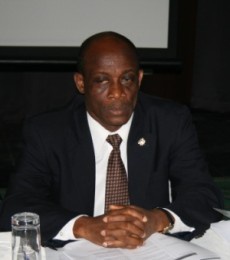
Government’s budget deficit target of 9 percent of output is under threat from the significant challenges during the first seven months of the year, the International Monetary Fund (IMF) has warned.
The Fund said lower-than-expected revenues and overruns in the wage bill, electricity subsidies, and high interest payments on public debt are putting the public finances under stress.
In a statement that underlines the fiscal task facing government, the IMF said in spite of efforts to raise additional revenues and curb spending, it will be difficult for the government to keep the deficit below 10 percent of GDP.
“While Ghana’s medium-term economic prospects remain strong, short-terms risks arise on the back of sizeable fiscal and external imbalances,” Christina Daseking, head of a visiting team to Accra from the Fund, said in a statement.
“The main risks to the economy arise from a large current account deficit -- projected to increase to above 13 percent of GDP in response to much weaker gold and cocoa prices and ongoing fiscal pressures.”
On Wednesday, the Bank of Ghana (BoG) said the budget deficit in the first seven months of the year was 6.3 percent of GDP against a target of 5.6 percent. It said total fiscal revenue and grants was GH¢10.4billion, below the target of GH¢12.5 billion -- mainly due to shortfalls in revenue collections and poor disbursement of external grants.
Government responded to the revenue gap by keeping total expenditure below target. However, spending on wages and interest payments exceeded their targets. The wage bill, which was the main cause of fiscal dislocation in 2012, amounted to GH¢5.5billion between January-July against a projection of GH¢5.1billion. Interest payments breached its GH¢1.8billion target by GH¢0.8billion.
“Considering the unsustainable wage dynamics of recent years, a different approach is needed, based on wage moderation and strategic choices about the size and composition of the civil service,” the IMF said.
“The biometric registration of all public sector employees, the planned introduction of new HR guidelines to control hiring, and the agreement to settle wage negotiations before the budget discussions are positive first steps,” it added.
The Fund welcomed efforts to restore electricity tariffs to cost-recovery levels, which will free resources for more critical spending such as on social investment and infrastructure -- areas that are vital to lift living standards and improve business competitiveness.
So far, a consensus has emerged that Ghana’s fast-paced GDP growth is not matched by adequate job-creation to reduce idleness and underemployment among the country’s youth.
In the first quarter of the year, economic growth weakened; but BoG Governor Henry Kofi Wampah said there are signs output is picking up, and that this is likely to improve revenue performance in the remaining months of the year. The IMF has forecast full-year growth of about 7 percent compared to the government’s projection of 8 percent.
Unlike the IMF, Dr. Wampah was more upbeat about the deficit, saying: “The target of 9 percent is still within range. From where we are sitting, it is possible that the target will be achieved.”